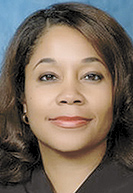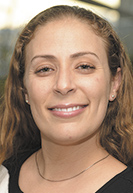Subscriber Benefit
As a subscriber you can listen to articles at work, in the car, or while you work out. Subscribe NowWalking out of federal prison after more than 20 years, Thomas Ridley had $45, a criminal record and the belief he would be re-arrested and soon returned to a cell.
He had had little trouble finding help to settle into the world of crime and drugs. That life had led to encounters with the police, prosecutors and courts, and eventually earned him a lengthy sentence behind bars.
By comparison, locating the support and resources he needed to live in law-abiding society was much more difficult. Finding a job, a place to stay, getting a driver’s license and even having enough food in the cabinets are among the obstacles ex-offenders must overcome to remain outside the jailhouse walls.
Ridley got the assistance he needed from the very judge and in the very courtroom where he was sentenced to federal prison. He participated in the REACH (Re-Entry and Community Help) program run by Senior Judge Larry McKinney of the U.S. District Court for the Southern District of Indiana. The project takes what the court calls the “worst of the worst” ex-offenders and offers them a hand to break the cycle of bad decisions, criminal behavior and reincarceration.
A robust man with an easy manner, warm demeanor and quiet eloquence, Ridley said the program offered “beautiful help.” He credited it with enabling him to get reintegrated into society, rather than making the trip back to prison, and helping him find his place where he can make a contribution.
“We receive all this wonderful stuff,” Ridley said.
Accepting help
The REACH participants gather at the Birch Bayh Federal Building and U.S. Courthouse in Indianapolis the first Thursday of every month. One class will meet in McKinney’s courtroom and another will convene in Judge Tanya Walton Pratt’s courtroom.
 Pratt
PrattA few days after the Labor Day holiday, the handful of ex-offenders took seats in the well of McKinney’s courtroom, some at the counsel tables and a few in the jury box. Sprinkled around the room were Senior U.S. Probation Officer Ryan Sharp, Assistant Federal Defender Sara Varner and Assistant U.S. Attorney for the Southern District of Indiana Doris Pryor.
Everyone stood when McKinney, wearing his black robe, entered and together recited the Pledge of Allegiance. Then, one by one, the participants stood at the lectern and told the judge what they had been doing the past month, their accomplishments, their joys and their struggles.
The stories ranged from discouragement at having failed the commercial driver’s license test to happiness at getting a house and making plans to marry. One man talked about being able to use the bus to get to his job washing dishes and another talked about his progress in getting a floor-cleaning business launched. Several talked about spending time with their children.
McKinney leaned back in his chair, asking questions and offering both encouragement as well as gentle admonishment. He told the man having trouble passing the CDL test that once he got his license, no one would pull him over to ask how many times he had to take the exam. He counseled another about setting aside a portion of his paycheck to cover the restitution he still owed, and he praised one man who had demonstrated he was trustworthy.
Also, McKinney repeatedly reminded the participants the REACH program was more than a monthly court appearance. The court, the attorneys and the mentors were accessible every day to guide the ex-offenders and find the resources they needed.
The mentors primarily are students from Indiana University Robert H. McKinney School of Law. They work with the participants to set goals then provide the support to achieve those ambitions. The students can help the individuals draft a résumé, fill out a job application, find transportation and get medical care.
 Silva
SilvaIU McKinney professor Lahny Silva oversees the students helping the REACH program. Along with learning courtroom procedure, Silva said the students gain advocacy skills, often having to confront and push through administrative barriers because they realize the participants are depending on them.
Accepting help can be difficult. For years, the ex-offenders have relied on only themselves, so learning to trust and ask for assistance does not come naturally. Although some participants may need two or three months in REACH before they accept help, their physical appearance changes immediately once they do. They stand straighter and smile, Varner said.
She also has noticed her students and the ex-offenders develop a bond. “It really feels like magic,” she said.
Fairness and kindness
McKinney has presided over trials and sentenced defendants for 40 years. The REACH program gives him a unique set of judicial duties allowing him to fulfill what he has long seen as the court’s obligation to assist offenders when they are released from prison.
Re-entering society is difficult. Even with the support provided by REACH, some participants do not complete the 12-month program. One man was pushed back into crime by his family who enjoyed too much the money he made, and another died of an overdose.
Pratt has seen the same cycle in her courtroom. Individuals on probation or supervised release who do not have shelter or food or a job will fall back into crime and eventually return to prison. The REACH program gets the ex-offenders what they need to be successful and gives the judges the opportunity to break the cycle of mass incarceration.
Getting a REACH program in her court eight months ago, Pratt described the work as time consuming and intensive.
“Only thing that has surprised me is how grateful they are for little things that we take for granted,” Pratt said of the ex-offenders. Likewise, she noted, the participants are impressed by the assistance they receive, especially since many “have come from very unfortunate circumstances” and often never had anybody helping them.
One man was proud of his glasses. He had been squinting and scrunching his face in the REACH program until Pryor finally figured out he could not see. She contacted Silva, who contacted the Indiana University School of Medicine, and soon the man was emailing friends pictures of his new spectacles.
Every month, the participants who keep progressing are given a certificate and a handshake by the judge. They value that sheet of paper, Pratt said, because it is something they can hang on their wall that shows their accomplishments.
A man in McKinney’s courtroom was excited to be nearing the completion of his time in the REACH program. Graduates are given a small party and he was requesting the menu include a vegetable tray with dip and a cake. But in updating McKinney on all that he had been doing, the man underscored how difficult breaking the cycles of poverty and prison can be.
He noted two of his grandsons are in foster case. “My son dropped the ball,” he said.
One of his REACH mentees had already graduated from the program, but attorney Scott Montross was making plans recently to deliver dinner to the man’s house.
Through his years of volunteering to help the homeless, troubled youths and ex-offenders, the partner at Montross Miller Muller Mendelson & Kennedy LLP knows re-entry is a lifestyle. He helps support their lifestyle change by staying in touch through phone calls, get-togethers and always being available for advice.
The success of participants in the REACH program “reinforces my belief that if you show kindness to folks in these circumstances, it brings out the best in them,” Montross said.•
Please enable JavaScript to view this content.
